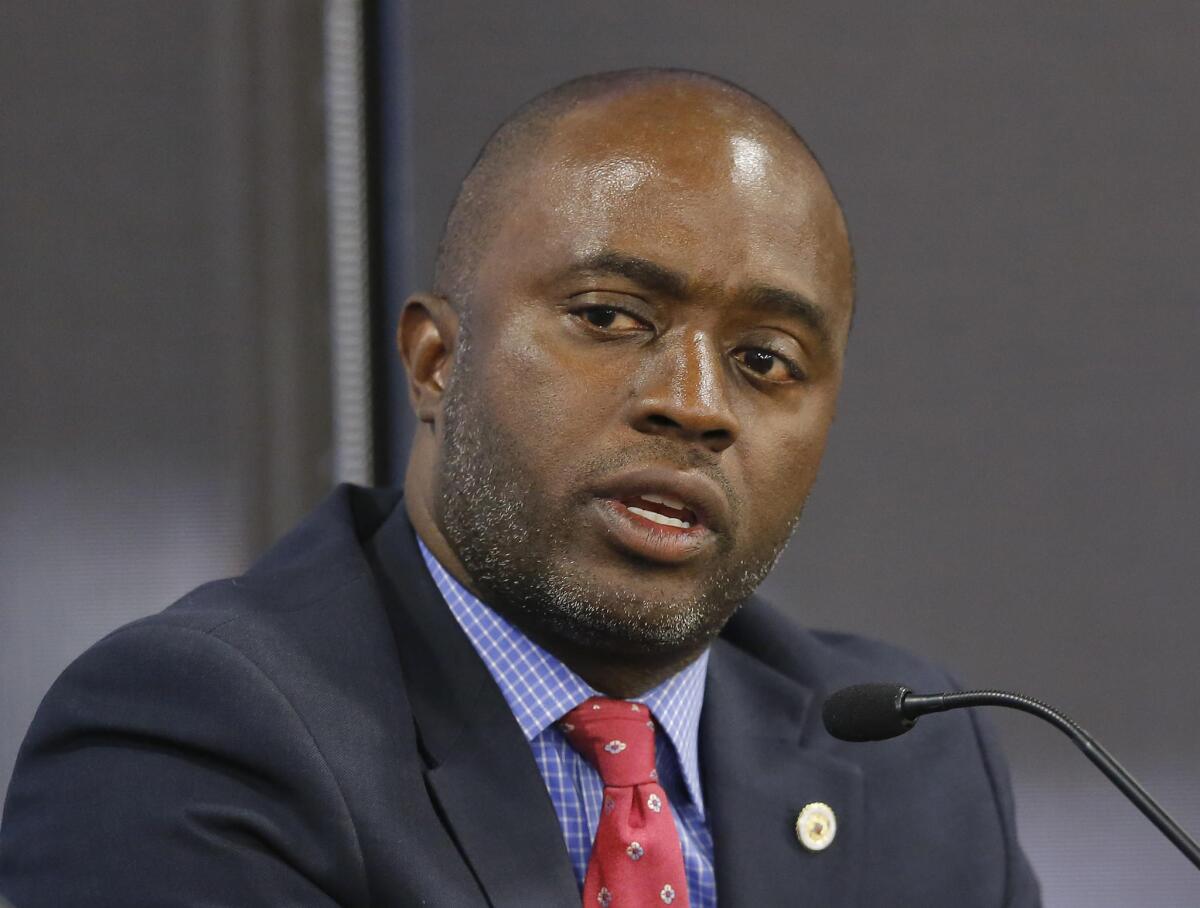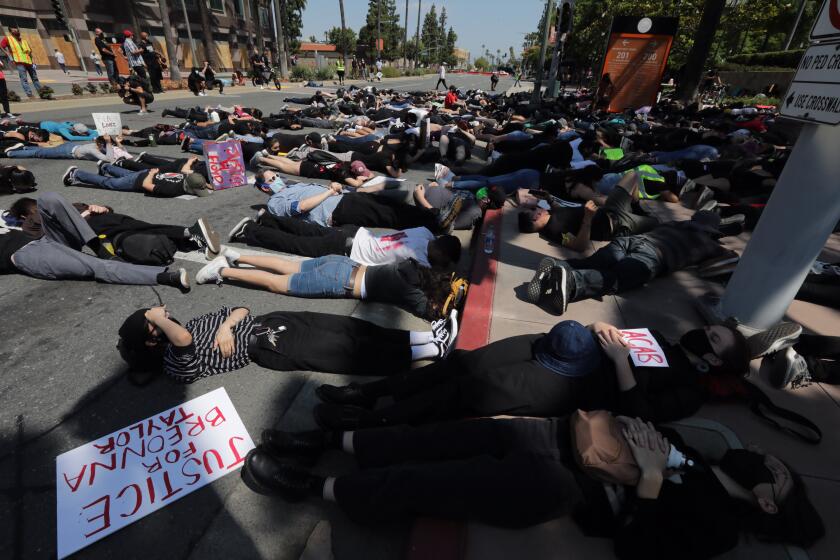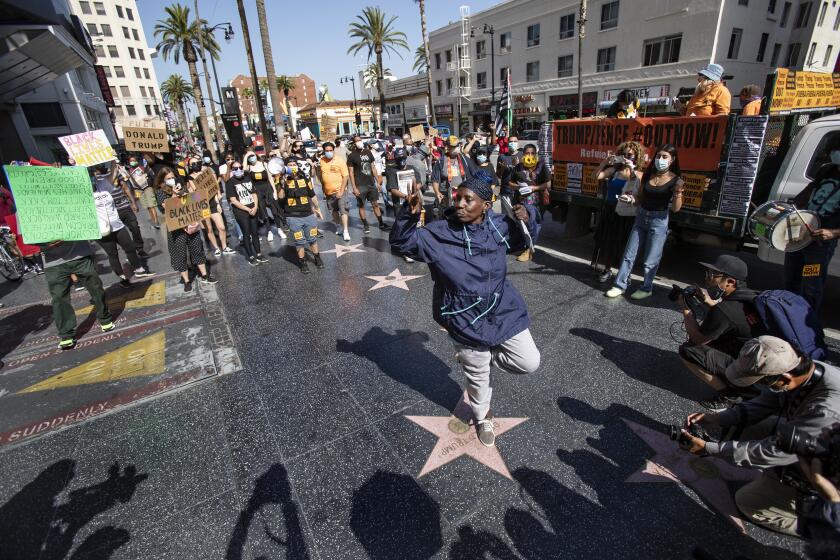Column: After George Floyd’s death, we need action. Fire bad cops now

- Share via
SACRAMENTO — California schools chief Tony Thurmond reacted instinctively when his car was pulled over by a highway patrolman. Thurmond is black. The officer was white.
“I put my hands on the dashboard,” Thurmond told me. “My heart was pounding out of my chest.”
Why was he pulled over?
“The officer never said. I don’t think we were speeding.”
The “why” doesn’t matter in this case. That’s not the point.
The point is that one of the highest-ranking elected officials in this reputed progressive state — the superintendent of public instruction — possesses such an ingrained fear of white cops that he automatically placed his hands on the dashboard to show he wasn’t holding a gun.
How many white guys have felt compelled to do that?
It didn’t happen when Thurmond was a teen. It happened earlier this year, when he was 51.
It’s even more remarkable because Thurmond, riding in the front passenger seat, was being driven home to the Bay Area from Sacramento by a white, plain-clothes California Highway Patrol officer in an unmarked CHP car. They were driving along I-80 at dusk.
When the driver told the patrolman that his passenger was the state superintendent of public instruction, the officer backed off.
Since George Floyd died, black people are getting messages and money from white people they barely know. Here are the dos and don’ts of being a white ally.
Thurmond is about the last person you’d think would be fearful of being stopped by a cop — that is, if he wasn’t black.
“I’m not saying I have ever been harassed by a police officer,” Thurmond emphasizes. “I will not demean police officers. But you betcha that every time one is behind me, I’m scared because of the pattern of black men being pulled over and black men losing their lives.
“It doesn’t matter that I’m a legislator or a state official who’s wearing a black suit. It doesn’t matter my title. I’m seen as a black man. And when I’m pulled over, I need to put my hands on the dashboard. I feel very vulnerable.
“That’s what I’ve taught my children.”
If a high state official harbors that fear, try to imagine how a young black man driving an old wreck must feel.
Thurmond says that the universal feeling of racial discrimination among black people “is what has created this outrage that is boiling over. If this bias happens enough, people are going to become obsessed and angry and that’s what we’re seeing.”
Combine the lifelong experience of racial prejudice with the current stay-at-home virus pandemic, the resulting record job layoffs and the repeated TV footage of an unarmed black man’s neck being crushed by a white policeman’s knee and “all these factors are crashing together,” Thurmond says.
Pollster Mark Baldassare of the nonpartisan Public Policy Institute of California agrees. A PPIC statewide survey in February asked adult Californians whether they believed the police treated all racial and ethnic groups fairly.
Roughly two-thirds of white people, Asian Americans and Latinos answered that police treated all races fairly most of the time or almost always.
But only one-third of black people felt that way.
“They don’t trust the police,” Baldassare says. “Their experience is that they’re not treated fairly.”
And after George Floyd’s killing by the white cop, that feeling of unfairness, exacerbated by the pandemic and layoffs, spilled over into nationwide protests in cities of all sizes — mostly peaceful in daytime, with violence and looting at night.
It’s pretty much deja vu for many of us. I vividly remember the devastating Watts riots in 1965 and the Rodney King riots in 1992, both erupting from racial tension — the latter when a black man was beaten unmercifully by white Los Angeles police.
Both tragedies resulted in grandiose post-riot blue ribbon commission studies. If either accomplished much, it wasn’t evident to me.
The death of George Floyd sparked protests in Minneapolis, Los Angeles and New York. The officer who knelt on Floyd’s neck was charged with third-degree murder and manslaughter on Friday.
Today, we don’t need any more studies. We need action. Bad cops need to be fired and, if warranted, prosecuted when they inflict bodily harm unnecessarily. If convicted, they need to be incarcerated.
Other bad cops who stand by and watch a colleague abuse an unarmed person without trying to stop him also need to be fired and prosecuted. Fortunately, they’re doing that in Minnesota with the shameful Minneapolis officers.
Bury the law enforcement buddy system.
Hold everyone accountable, including the police chiefs and sheriffs.
Same thing with looters and vandals. Arrest, prosecute and jail them. Thousands thankfully have been arrested throughout California. They’re not activists, they’re anarchists.
State Senate leader Toni Atkins (D-San Diego) issued a statement the day after the first night of looting that declared:
“We have seen violence and looting spurred by those who are out to commit crimes of opportunity, out to divide our communities for political gain or out to cause damage for damage’s sake. … We are on to you and you will not succeed in tearing us apart.”
Strong words that need to be followed up with aggressive prosecution.
Last year, Assemblywoman Shirley Weber (D-San Diego), chairwoman of the Legislative Black Caucus, finessed a landmark police reform bill through the Legislature that Gov. Gavin Newsom signed. It should be a national model.
The main thing it did was require that law enforcement use deadly force only when “necessary” instead of the old standard: when “reasonable.”
“But we can’t just pass a bill, we have to make it work,” Weber says.
That will require enough money for solid police training and dedication by chiefs and sheriffs — plus ongoing commitment by the politicians, even after the protests and looting stop.
The goal should be that Thurmond’s grandkids won’t have to be taught to put their hands on the dash.
More to Read
Sign up for Essential California
The most important California stories and recommendations in your inbox every morning.
You may occasionally receive promotional content from the Los Angeles Times.













